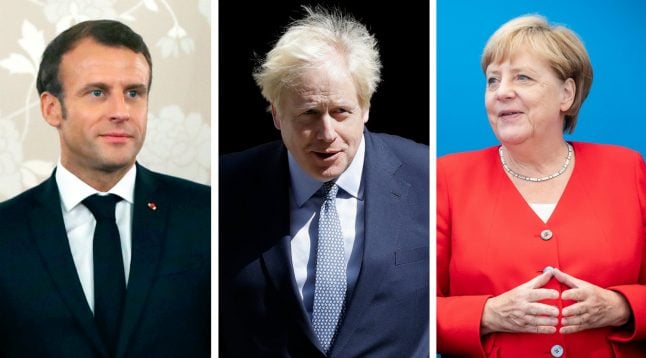Boris Johnson is set to meet European leaders this week as he embarks on his first trip abroad since becoming UK prime minister in July.
And, according to media reports, Johnson is expected to use his trip to urge German Chancellor Angela Merkel, as well as France's President Emmanuel Macron, to restart negotiations in a bid to avoid a no-deal Brexit, and to inform them that the British parliament cannot reverse the outcome of the Brexit referendum.
He is expected to visit Merkel in Berlin on Wednesday and lunch with Macron in Paris is scheduled for Thursday, ahead of the G7 summit of world leaders in Biarritz.
“Johnson is expected to tell them that they have two months to agree a deal acceptable to the cabinet and parliament, without which the UK will exit without an agreement on Halloween,” said the Sunday Telegraph newspaper.
READ ALSO: New law set to guarantee Brits residency in Germany in case of no-deal Brexit
Merkel had invited Johnson to visit Berlin following his appointment as PM.
However, it is unlikely Merkel will stray far from the agreed line when it comes to Brexit. Up to this point, the EU has refused to start new Brexit negotiations with Johnson, saying that a deal had already been struck with Johnson's predecessor Theresa May.
That deal has been rejected by the British parliament on three occasions, leading to the resignation of May.
Last week Merkel did, however, speak out over the importance of close ties between the UK and the bloc with regards to a future trading relationship. Germany is currently in a tough position, with suggestions that a recession is on the horizon.
During a meeting in Lithuania, Merkel said she had made clear “that we want a withdrawal that will at the same time yield a close partnership between Britain and EU member states”.
'High probability of no-deal'
It came after internal documents revealed on Friday that the German government believes there is a “high probability” of a no-deal Brexit on the October 31st deadline. In the paper, the government said it is “inconceivable” that Johnson will soften his tough position on the Irish backstop.
The assessment of the situation was made in an internal Finance Ministry document which underlines the German government’s firm opposition to any re-negotiation of the withdrawal agreement as demanded by Johnson.
Meanwhile, according to a report in the Sunday Times sourced from leaked documents, the UK government expects shortages of food, medicine and petrol in the event no withdrawal agreement is struck.
As The Local has reported, Germany has been stepping up its preparations for a no-deal. In this scenario, British people living in Germany would assume the status of Third Country Nationals, similar to citizens from countries that are neither members of the EU nor of the EEA.
However, the German government plans to bring in legislation that guarantees all British people and their family members living in Germany will receive residence permits if the UK crashes out of the EU without a deal.
British nationals have also been warned by the British Embassy in Germany to prepare for the possibility of a no-deal. They've been urged to register with their local immigration office (Ausländerbehörde).
The German government has repeatedly said that no Briton will be asked to leave Germany in the event no agreement is struck.
If no withdrawal agreement is in place by October 31st, Germany plans an initial transition period of three months, which will likely be extended by a further six months. This will give Brits more time to apply for a residence permit to ensure they can stay in the future.
READ ALSO: Brexit limbo: How Brits in Germany are trying to secure their futures



 Please whitelist us to continue reading.
Please whitelist us to continue reading.
Member comments